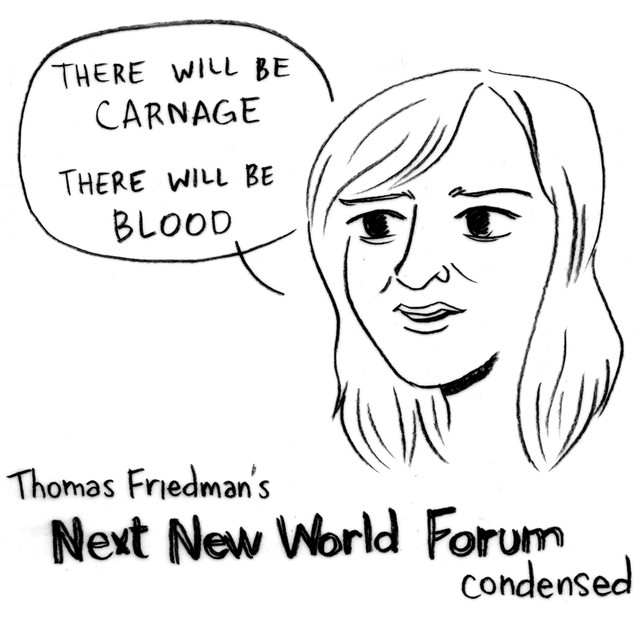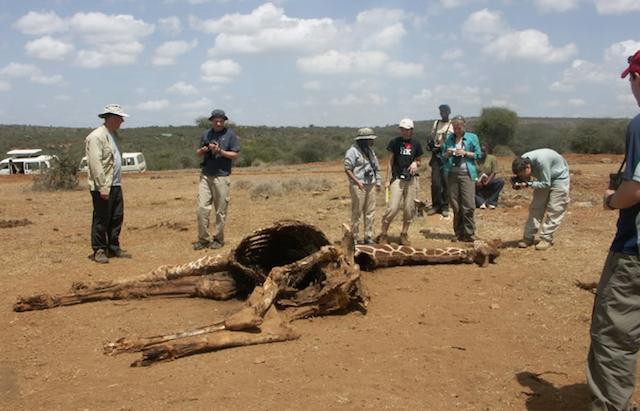21st-Century Concentration Camps
by Awl Sponsors
In this video, Nicholas Kristof travels to Myanmar, where Muslims are confined to camps or within their own villages, deprived of jobs, schools and doctors.
The video above is a part of Times Video’s “Op-Docs” series — a collection of short, opinionated documentaries produced with wide creative latitude and a range of artistic styles, about current affairs, contemporary life and historical subjects.
Find more immersive video content at Times Video.
The View from Tom Friedman's Next New World
by Susie Cagle

Last week, Susie Cagle went to Thomas L. Friedman’s Next New World conference with “leaders drawn from the C-suite, government, education, think tanks and other fields for a “compelling forum on how growth is generated and how the workforce needs to be educated to acquire the skills necessary in the 21st century.” This is what she saw.

Susie Cagle is a journalist and illustrator based in Oakland, California.
Cures for Afflicted Children
by Noah Kulwin

In an age of disease, child labor has consequences. An eleven-year-old tasked with cleaning the bathrooms at LeConte Elementary School came down with whooping cough as a result, according to his mother. As she points out, “bathrooms are health hazards,” particularly ones in elementary schools, which are essentially factories that specialize in the production of terrible and exotic diseases.
The child’s mother does not note, curiously, that according to numbers from the Department of Public Health, four percent of students at LeConte Elementary were exempted by their parents from getting vaccinations for whooping cough. Hrm. Fortunately, there are plenty of remedies for whooping cough that should satisfy even the most fervent opponent of vaccination:
• “dipping the persons affected nine times in an open grave”
• “hanging the head of a child out of the window of a train going through a tunnel”
• “take a dead beetle, hang it around the neck of a child with whooping cough and as the bug rotted away, the cough vanished too”
• “pass the child through the arched roots of a bramble bush”
• “feeding afflicted children either roasted or fried mice”;
• “give the afflicted a piece of bread made by a woman who has successively married two men, both of whom shared the same last name”
• “drinking milk a trout has been made to swim in”
•“feed the hair of the sick baby to a dog, hiding the hair in bread and butter [and] if the dog dies, the baby will recover”
Be well.
Noah Kulwin is The Awl’s summer intern.
Story Covered

No giraffes in Ghana! Delta sorry for World Cup tweet
Delta Air lines blasted for Ghana World Cup defeat ‘Giraffe’ tweet
Delta’s World Cup Tweet Really Couldn’t Have Gone Worse
Delta Airlines accused of racism over ‘giraffes in Ghana’ tweet
Delta Airlines offends with World Cup tweet
Delta Air Lines Loses the World Cup: What Do Giraffes Have To Do With Ghana?
Delta Airlines thinks Ghana has giraffes and commits the first social media fail of the World Cup
Delta Apologizes For Ghana Giraffe Gaffe On Twitter
Delta Used an Image of a Giraffe to Represent Ghana in Tweet, But There Are No Giraffes in Ghana
Giraffe gaffe: Delta apologizes for USA-Ghana World Cup tweet
Delta Airlines World Cup tweet blasted after USA beats Ghana in opener
Delta learns the hard way that Ghana doesn’t have giraffes
Delta Airlines in Twitter storm after Ghana giraffe gaffe during World Cup
Delta Airlines Tweets Apology after Depicting Ghana with Picture of Giraffe
Delta’s Pro-USA World Cup Tweet About Ghana Called ‘Racist’
Delta Just Tweeted A Giraffe To Represent Ghana, Because Africa
Delta Airlines Learns Giraffes Don’t Live in Ghana
Delta’s World Cup social media giraffe, er, gaffe
Delta Airlines Posted A Controversial Tweet Following The USA’s World Cup Victory Over Ghana
Airline’s tweet to U.S. World Cup team panned as ‘poor taste’
Giraffe Gaffe: Delta Airlines drops the ball congratulating Team USA
No giraffes in Ghana! Delta ‘sorry’ for World Cup tweet
Delta Tweets and Deletes Seriously Inaccurate World Cup Image
Twitter users unleash furor over Delta’s World Cup tweet
Airline apologises for World Cup Twitter gaffe
American Airline gets in trouble for ‘offensive’ World Cup tweet
There Are No Giraffes In Ghana, Delta
World Cup fans get bitter on Twitter over Delta’s racist slip-up
Delta Apologizes for Boneheaded World Cup Tweet
The biggest loser of the World Cup on Monday? Delta after its ill-conceived tweet following U.S. win
Delta’s Twitter feed has a rough time Monday night
When Tweeting About the World Cup Goes Wrong
Photo by Biological Ramblings. First links via Matt Pearce.
Bleaching the Jury Pool
The influx of the young and rich into Brooklyn is, according to the New York Post, “gentrifying” jury pools, making them more trustful of the police and less trustful of plaintiffs in civil suits.
“People who can afford to live in Brooklyn now don’t have the experience of police officers throwing them against cars and searching them. A person who just moves here from Wisconsin or Wyoming, they can’t relate to [that]. It doesn’t sound credible to them.”
“Bu-bu-but,” the young white man protests, “I’ve seen The Wire. Twice. Except for the second season which I don’t like all that much though I can’t quite put my finger on why, just something about the characters I guess? Anyway, I know what it’s like. I get it. Omar’s the best, right? What a character. But yeah, I empathize man.”
The Collage Artist
by Phil Freeman

If Lana Del Rey were a Tumblr, she would be photos of Elvis, classic cars, movie posters, and vintage paperback covers, broken up by YouTube clips of singers performing string-slathered ballads on decades-old TV shows. Her early self-descriptions — “gangsta Nancy Sinatra,” “Hollywood sadcore” — seem to suggest meaning. But when you think about them too long, they dissolve into nothingness. That vagueness — the hand-waving in the direction of something that once meant something specific, but is now an archetype, hollow and half-obscured by a glow of glamor and nostalgia — is her artistic strategy. And it’s working: Lana Del Rey is appealing because she is a self-curated collage of references and images in which she sees her reflection, just like the rest of us.
Del Rey’s first video, the brilliant “Video Games,” was a laptop-assembled mash of selfie-like headshots, paparazzi footage of Paz de la Huerta falling down at a public event, American flags waving, skateboarders, and movie clips. Del Rey quickly abandoned this low-budget approach; later videos, particularly “Born To Die,” the JFK-inspired “National Anthem,” and “Ride,” assembled “all-American” cultural iconography into hyperreal tableaux, like Guess Jeans commercials directed by Matthew Barney. The combination of catalog-model looks, deadpan singing and the lush, often seemingly half-speed music gave her work the power of a recurring dream.
Yet, while Del Rey’s videos are lavishly over the top and directed with breathtaking precision, her lyrics are minimalist, attempting to sketch stories in a line or two through the use of familiar images — familiar not because they have any particular resonance or specificity, but because they’re songwriting clichés, like starting a blues number with “Woke up this morning.” She frequently deploys such totemic objects as shorthand characterization — “he drives a Chevy Malibu,” Beat poetry, jazz records, black nail polish, hydroponic weed, and lines of cocaine. On “Cruel World,” the opening track from her new album Ultraviolence, she croons, “You got your Bible and your gun.” That’s fine, the juxtaposition is a familiar one. But then she follows it with, “You like your women and you like fun,” a line so giddily dumb that it recalls Iggy Pop’s “I love girls/They’re all over this world,” from 1979’s New Values. She nods to pop music history at times, too: “He hit me and it felt like a kiss,” she sings on the album’s title track, quoting a Crystals song that wasn’t even a single back in 1962, but which has gained a cultish afterlife, particularly since being covered by Hole.
Even when the lyrics seem half-finished, the music is impressive. The first sound heard on Ultraviolence is a twanging guitar that wouldn’t seem out of place on a Dusty Springfield record, bolstered by thumping cardboard-box drums and a psychedelic echo effect like an owl hooting in a tunnel. Mostly produced by Dan Auerbach of the Black Keys, Ultraviolence falls somewhere between countrypolitan Nashville and Phil Spector’s Wall of Sound, the guitars mostly twangy and reverb-soaked, occasionally veering toward psychedelia (the solo at the end of “Pretty When You Cry” sounds like a studio pro doing his best David Gilmour impression). There are synth and mellotron strings, pedal steel, and saxophone here and there. The drums have a subdued boom, like underwater explosions. Close your eyes and you can picture stoic studio musicians recording these tracks in a cavernous white-walled studio, Del Rey singing into one of those big vintage microphones. It’s a retro sound, but not reactionary. As ever, the goal is to go big, to be widescreen and awe-inspiring, and it works. This album should be played on a loop in a room at the Whitney.
There are no uptempo songs on Ultraviolence; it seems to drift by in slow motion. “Cruel World” flows along with a dreamlike slowness, the arrangement growing measure by measure until, when the chorus arrives, it erupts like Jane’s Addiction’s “Up the Beach.” Still, the words refuse to elevate things to the epic level the music seems to demand; they’re a bare-bones sketch of a dead relationship. “I’m finally happy/Now that you’re gone,” Del Rey sings, though her voice — half Françoise Hardy, half Nico, and slurring like she’s a little bit drunk — betrays no pleasure. Occasionally, her voice slips out of control, as on the deliberately raw first verse of “Pretty When You Cry” or the baby talk she slips into on several tracks. When she really lets her voice rip, she’s got an impressive range. But she doesn’t do it often, probably because it would bring her too close to breaking character. Restraint, and keeping the world at a distance, whether through music of an otherworldly lushness or lyrics so seemingly banal they’re almost alienating, is key to the performance.
Lana Del Rey is a Cornell box of twentieth century cultural icons — her brilliant half-hour film from last year, Tropico, gives us John Wayne, Elvis and Marilyn Monroe, plus quotations from Walt Whitman and Allen Ginsberg — all gathered, layered and juxtaposed in an attempt at creating an identity which can then be performed. Similarly, her impassive expression, regarding us from behind an open car door on Ultraviolence’s cover, invites us to make her art an element in our own collages. We can add “Lana Del Rey fan” to the list of things we tell others, when we need to “reveal” “who” “we” “are.”
Phil Freeman is the editor of burningambulance.com.
New York City, June 15, 2014

★★★★★ Some group of chaperoned teens, many in pink shirts, had swarmed into the Gray’s Papaya from the 72nd Street side, forcing the line to bend back on itself out the wrong door. The tissue-paper pineapples and cherries hanging below the ceiling tiles swung and twisted in the breeze. The crosswalk stripes were like a fluorescent-tube installation underfoot. The party balloons, herded down Amsterdam, tugged at their ribbons without getting rambunctious. In the midst of the two-year-old’s nap, the doorbell announced the upstairs neighbor, armed with a brand-new plastic lightsaber. John Williams music thumped out of the piano to welcome him. It took a long time in the imperfectly dimmed bedroom to dispel the excitement. After the rest of the nap, after pizza and ice cream cake upstairs and down, the two-year-old found himself out on the plaza in possession of a stout water gun, his t-shirt soaked through. The older children blasted each other’s face paint into smears and drips. The two-year-old assaulted the plantings for a while, then assumed a tactical stance behind a railing. Certain children directed fire toward a pigeon, before the last of the water ran out and the militia disbanded. Out on Amsterdam again, a ladybug flashed by, a fleck of opaque amber, and landed audibly on the tinted window of the cleaner’s. The clear light found the soot on the architectural detailing and gave a mineral shine to unwashed upper windows. A service superstructure — water or elevator? — was more finely ornamented than the brown brick box of the apartment house below it. Sunset was colored-pencil work.
Experts Consulted
“And who better to lead a cast of assorted hawks back into intellectual — and they hope eventually political — influence than the congenial and well-respected scion of one of America’s first families of interventionism?”
Why You Should Never Go Home
by Matthew J.X. Malady
People drop things on the Internet and run all the time. So we have to ask. In this edition, writer Kevin Nguyen tells us more a recent family reunion.
Family reunion: 13 people in a 3-bedroom house with 1 bathroom.
— Kevin Nguyen (@knguyen) May 24, 2014
Kevin! So what happened here?
I was in Sacramento for Memorial Day weekend to visit my mom’s side of the family — aunts, uncles, cousins (SO MANY COUSINS) visiting from all over California. I hadn’t seen them in about four years, and I forgot how we cram ourselves into our grandparents’ house and sleep on shared beds and couches. (One young cousin, Jeremy, said he wanted to sleep on my air mattress so he could wake me up in the middle of the night with his screaming.) At least the bathroom situation worked out because there was no hot water, so no one was in the shower for more than a couple minutes. You could tell if someone was in there because they’d be yelling “COLD, COLD!” In hindsight, there was lots of shouting that weekend.
Like many families, mine has a lot of criticism to give. Some examples:
• Seeing that I had a Mac, my 16-year-old cousin Brian said that I should get a PC instead, which he considers “the master race” of computers. When I told him that was a reference to the Nazis, he said, “No, it’s a good thing.”
• Tyler, who is in seventh grade, called me out for having only 200 Instagram followers. He seemed really disappointed in how few likes I get for my photos. (Apparently it’s “embarrassing” to get fewer than 50 for any picture.)
• Khoi was even more disappointed in my Flappy Bird high score. He opened the app on my phone and, on his first try, scored 104.
• My grandfather asked when I was going to get my master’s degree (doesn’t matter in what).
• My grandmother asked when I would meet a nice Vietnamese girl (doesn’t matter who).
• Even my mom suggested I date a girl who doesn’t like books, so I’m “not always talking about books.”
Why don’t you visit your family more often? And what are some of the challenges you run up against when you do see them?
I live in New York, so it’s a bit far for me to travel. But my grandfather had a stroke a few months ago. While he’s actually recovered from it remarkably well, it was definitely a moment where we realized he wouldn’t live forever. The day before we arrived, he hurt his back trying to lift something — somewhat ironically, in an attempt to tidy up for all his guests. So he was stuck in bed, unable to move, for most of the time we were there. He thought it was a herniated disc or something more serious. We would carry him out to the living room and lay him on the coffee table so he could be around people. It was strange seeing him like that. This is a guy who was a colonel for the South Vietnamese Army during the Vietnam War. Dude seems invincible.
Visiting is always a little jarring for me. I don’t speak Vietnamese well enough to keep up when my grandparents, aunts, and uncles are conversing. So I spend most of my time hanging out with my cousins, who are all a bit younger than me — most of them are from middle school through college age.
We basically sit on the floor and play this Vietnamese card game called Tiến lên (Thirteen) for hours on end. It’s sort of like Poker meets Uno. It’s a little strange, though, because my mom’s side of the family has a severe gambling problem that goes back to my grandmother. She is 4-foot-6 and exclusively wears muumuus. She also knows more about the NFL than anyone I’ve ever met. She made a lot of money betting on the Cowboys in the ’90s, though has probably lost as much since then. And though she barely speaks English, my grandmother can talk about football player statistics all day long. I’m also told she used to disappear for days at a time to go gambling, and no one is quite sure where she went.
Anyway, Tiến lên is the single activity that everyone can relate on. For some of the family members that only speak Vietnamese, playing cards is the only way I can engage with them. It’s both the biggest obstacle and the greatest unifying thing our family has.
Lesson learned (if any)?
Like the rest of my family, I too am very critical, especially of my younger brother, Jonathan. We’re very different. I sometimes disparagingly refer to him as a “brogrammer,” but really, he’s a very smart, thoughtful kid. Growing up, our parents compared us a lot, even though Mom said we were like “night and day.” I always did better at school, sports, whatever. My brother underachieved for a long time — he just didn’t really figure stuff out until after college.
Now my brother is a software developer and does very well for himself. I’m thrilled everything in his life is lining up the way he wanted. He’s good at his job and makes a lot of money.
But he can also be kind of insufferable about it. The whole weekend, my brother kept talking about the job offer he was going to get from a startup. It would be $100K at least. He said this over and over — I kept count: nine times. (In his defense, though, my family likes to talk about money.)
I had to bite my tongue when my brother told me the offer was from a startup that lets you make bets on sports. I pulled my dad aside and said I had misgivings about Jonathan working at a company that preys on the weakness that has really hurt our family. Dad asked why I couldn’t just be happy for him. It was a good question.
Jonathan is great. We just don’t see eye to eye on everything, and I think we’re finally accepting it. I guess that’s the thing with family: You don’t have to like them, you just have to love them.
Or just quietly roll your eyes when they brag about their $400 beanbag chair.
Just one more thing . . .
When my grandfather finally went to the hospital, it turned out that he had gout. Nothing more. When you eat a meat-rich diet, especially when you’re older, you end up with gout. (And trust me, my family eats a lot of meat. The night we arrived, my grandmother prepared chicken, pork, and salmon — all in one meal.)
When he got home from the hospital, we all gathered in the living room, opened a bottle of champagne, raised our glasses, and toasted, “to gout!”
Then me and the cousins went back to playing Tiến lên.
Matthew J.X. Malady is a writer and editor in New York.
